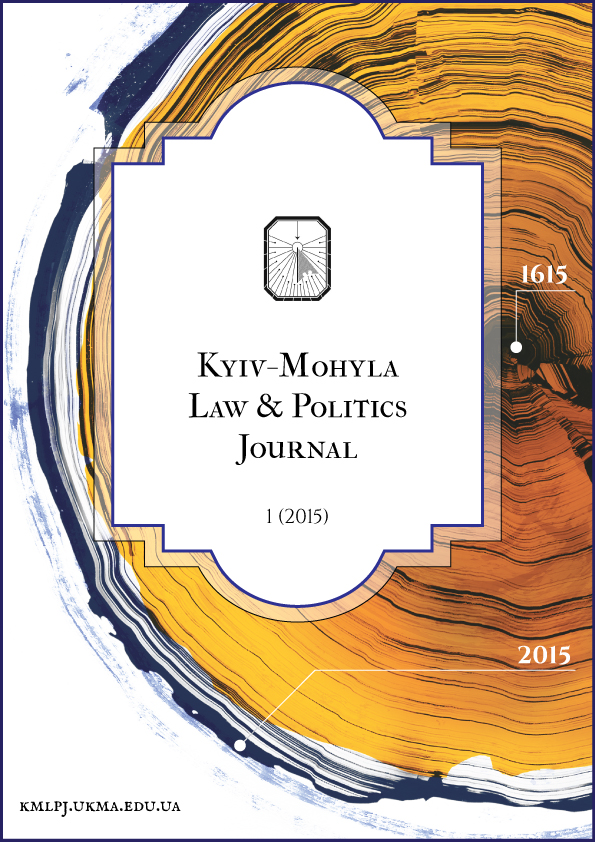EU Law Concepts as Legal Transplants: Linguistic Difficulties of Transferring EU Consumer Law Concepts into Ukrainian Legal System
DOI:
https://doi.org/10.18523/kmlpj52670.2015-1.207-231Keywords:
EU law, legal harmonization, consumer law, legal concepts, legal transplantationAbstract
This article’s purpose is to review certain EU legal concepts from a comparative law and linguistics perspective and to create guidelines for adapting these EU law concepts to the conceptual system of the member states. This article draws on comparative law studies for the theory of legal transplants and on linguistics for the methodology of terminology. After analyzing the EU legal concepts as a specific type of transplants, the article focuses on specific examples of legal transplantation from EU consumer protection law. In this process, the EU law is the source system and the Ukrainian law is the recipient. Based on the consumer protection law examples, this article identifies and explains the most common linguistic reasons for transplant failures, describes the possible legal outcome for the recipient legal system and proposes a possible solution using linguistic methods.References
- Baer, Susanne. “Traveling Concepts: Substantive Equality on the Road.” Tulsa Law Review 46 (2010): 59–79.
- Bell, John. “Mechanisms for Cross-Fertilisation of Administrative Law in Europe.” In New Directions in European Public Law, edited by J. Beatson and T. Tridimas, 149–51. Oxford: Hart Publishing, 1998.
- Brand, Oliver. “Conceptual Comparisons: Towards a Coherent Methodology of Comparative Legal Studies.” Brooklyn Journal of International Law 32 (2007): 491–534.
- Cabre, Maria Teresa. Terminology: Theory, Methods and Applications. Barcelona: Universitat Pompeu Fabra, 1999.
- Chandler, Jake. Elements of Deductive Logic. Sentential Form. KUL, 2012.
- Cohn, Margit. “Legal Transplant Chronicles: The Evolution of Unreasonableness and Proportionality in the United Kingdom.” American Journal of Comparative Law 58 (2010): 583–629.
- Evans, Vyvyan. “Lexical Concepts, Cognitive Models and Meaning Construction.” Cognitive Linguistics 17.4 (2006): 491–534.
- Hanyk-Pospolitak, R. Iu. “Poniattia ‘nespravedlyvi umovy v dohovorah’.” [“The Concept of Unfair Term in Contracts.”] Naukovi zapysky: Iurydychni nauky 64 (2007): 102–05.
- Harlow, Carol. “Voices of Difference in a Plural Community.” American Journal of Comparative Law 50 (2002): 339.
- Kischel, Uwe. “Legal Cultures – Legal Languages.” In Translation Issues in Language and Law, edited by F. Olsen, A. Lorz and D. Stein. New York: Palgrave Macmillan, 2009.
- Kjaer, Anne Lise. “European Legal Concepts in Scandinavian Law and Language.” Nordic Journal of International Law 80 (2011): 321–49.
- Leczykiewicz, Dorota. “Why Do the European Court of Justice Judges Need Legal Concepts?” European Law Journal 14.6 (2008): 773–86.
- Mattila, Heikki. Comparative Legal Linguistics. Aldershot: Ashgate Publishing, Ltd., 2006.
- Örücü, Erin. “What is a Mixed Legal System: Exclusion or Expansion?” Electronic Journal of Comparative Law 12.1 (2008). Accessed October 16, 2012. http://www.ejcl.org.
- Pavlenko, G. H. “Pryntsyp dobrosovisnosti u dohovirnyh zoboviazanniah.” [“The Good Faith Principle in Contractual Obligations.”] PhD diss., Kyiv, 2008.
- Sartori, Giovanni. “Concept Misformation in Comparative Politics.” The American Political Science Review 64.4 (1970): 1033–53.
- Cases Cited
- Judgment of the Court of Justice of 27 June 2000. Océano Grupo Editorial SA v Roció Murciano Quintero (C-240/98) and Salvat Editores SA v José M. Sánchez Alcón Prades (C-241/98), José Luis Copano Badillo (C-242/98), Mohammed Berroane (C-243/98) and Emilio Viñas Feliú (C 244/98). Accessed September 20, 2013, http://curia.europa.eu/juris/liste.jsf?num=C-240/98.
- CA judgment of 24 February 2004: Khatun & Others v. Newham LBC, [2004] EWCA Civ. 55.
- Judgment of the Court (Fourth Chamber) of 6 September 2012: Daniela Mühlleitner v Ahmad Yusufi and Wadat Yusufi. Case C-190/11. Accessed September 20, 2013, http://eur-lex.europa.eu.
- Joined Cases C-585/08 and C-144/09: Judgment of the Court (Grand Chamber) of 7 December 2010 (references for a preliminary ruling from the Oberster Gerichtshof (Austria)) – Peter Pammer v Reederei Karl Schlüter GmbH & Co KG (C-585/08) and Hotel Alpenhof GesmbH v Oliver Heller (C-144/09). Accessed September 20, 2013, http://eur-lex.europa.eu.
- Terminographic Sources
- Garner, B. A. Black’s Law Dictionary. Thomson Reuters, 2009.
- Iermolenko, Volodymyr, ed. English-French-German-Ukrainian Dictionary of EU Terminology. Kyiv: K.I.S., 2007.
- Karaban, V. I. English-Ukrainian Law Dictionary. Vinnytsia: Nova knyha, 2004.
- Wild, Susan Ellis. Webster’s New World Law Dictionary. Wiley Publishing, Inc., 2006.
Downloads
How to Cite
Issue
Section
License
Copyright (c) 2016 Olena Samsonova

This work is licensed under a Creative Commons Attribution 4.0 International License.
Kyiv-Mohyla Law and Politics Journal provides free access to original research without restriction barriers (i.e. subscription fees, licensing fees etc.).
Unless otherwise indicated, content is licensed under the Creative Commons Attribution 4.0 International (CC BY 4.0) license, which means you are free to:
distribute, remix, tweak, and build upon your work, even commercially
...provided that any use is made with attribution to author(s) and Kyiv-Mohyla Law and Politics Journal.
The copyright in the article or any other submission to Kyiv-Mohyla Law and Politics Journal shall remain with the author(s).
The journal allows the author(s) to hold the copyright without restrictions and will retain publishing rights without restrictions.








